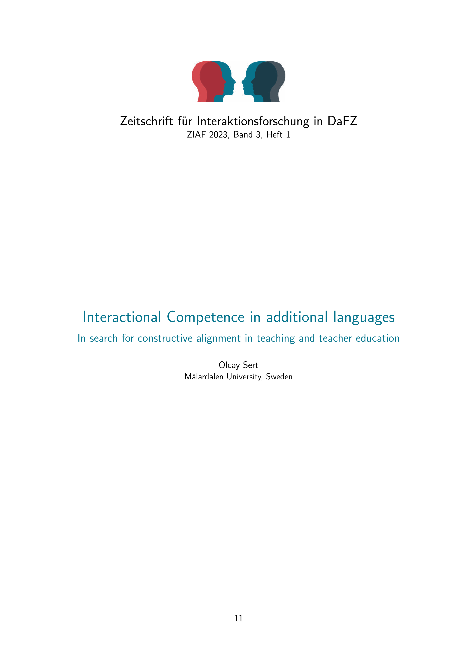Interactional Competence in additional languages In search for constructive alignment in teaching and teacher education
In this presentation, I describe interactional competence (in second languages) as a construct that spans over language learning, teaching, and teacher education, drawing on databases of learner-learner and teacher-learner interactions as well as data from teacher education contexts. I argue that in...
Furkejuvvon:
| Publikašuvnnas: | Zeitschrift für Interaktionsforschung in DaFZ |
|---|---|
| Váldodahkki: | |
| Materiálatiipa: | Artikel (Zeitschrift) Daten |
| Giella: | duiskkagiella |
| Almmustuhtton: |
Philipps-Universität Marburg
2023
|
| Fáttát: | |
| Liŋkkat: | Čájet merkoša Liŋkkat |
| Fáddágilkorat: |
Eai fáddágilkorat, Lasit vuosttaš fáddágilkora!
|
| Čoahkkáigeassu: | In this presentation, I describe interactional competence (in second languages) as a construct that spans over language learning, teaching, and teacher education, drawing on databases of learner-learner and teacher-learner interactions as well as data from teacher education contexts. I argue that interactional competence can be a key construct for teachers and learners alike and can inform both initial and in-service teacher education. Although we need much more research to explicate what it means to be interactionally competent for a learner and a teacher, there are already some promising findings from longitudinal and collection-based conversation analytic research. The practical implications of this line of research investigations into learning, teaching, and teacher education, however, need to be compiled and discussed from the perspective of a principled approach in education (e.g. constructive alignment). I will end the presentation by pointing to future research and teacher education practices. |
|---|---|
| DOI: | 10.17192/ziaf.2023.3.1.8589 |
